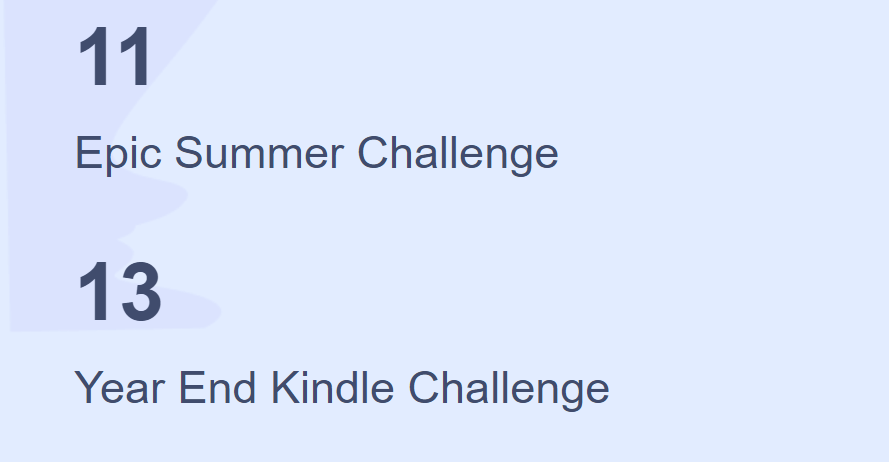Yesterday Amazon sent me an email announcing “Your End of Year Kindle Challenge wrap-up” — their capitalization, not mine. It was surprisingly underwhelming.
Amazon voraciously gathers user data. I assume I’m like most customers in that they periodically bombard me with emails announcing they’ve "found” something I’d be interested in. Inevitably, these turn out to be things I’d looked at and not bought a day or two earlier. But it makes the point that they’re watching.
So do the “similar purchase” things on most product pages, and this year the “sponsored item” junk in my searches on their site feel like they’ve exploded in frequency. In short, we know they’re paying attention.
That’s 11 or 13 books, right? Maybe? Because I don’t remember signing up for that many challenges.
So I had expected…I don’t know, maybe actual insights into what I’d read? Spotify manages to do that for my listening habits, so it’s possible. But not so much. The bare stats they provided in their email are almost perfectly context-free.
My favorite part of the email was what looks like a seed waiting to sprout a future chart crime:
Somewhere there’s a lonely denominator, hoping the Kindle folks will call it so it can participate in this statistic.
I’m not expecting email addresses for the top 1% so we can denounce their reading choices, but how about some, I don’t know…context? Maybe an average or two? (I won’t even ask for a median or mean…I mean, that’s advanced math.) Or some numbers? Or more words. What were the most popular or frequently books, in or out of the challenge? You can’t tell me Amazon doesn’t know that stuff.
How about starting with something like this?
Kidding aside, why is that Kindle doesn’t have a useful dashboard? (Or it it does, why isn’t it more obvious?) Imagine the marketing potential: “Hey, we noticed you used to read a lot more Steampunk Reverse Harem Werewolf Cozy Mystery Romances…”
It’s a disappointingly half-hearted effort from people sitting on a mountain of data about what I read — mostly bought from their store and read almost exclusively on one of their devices. My snarky side found it oddly similar to Amazon’s email announcing that they’re turning off their “Smile” charity donation program. If you’re not familiar with it, The Verge does a nice job dissecting their language choices.
Why does this matter, and why waste my own words on it? Simply, layoffs and business shutdowns are rippling through their global structure. Closer to home, Amazon is also ruthlessly pruning (sorry, “overhauling”) their magazine and periodical subscription business. This seems like an admission that what was once seen as a disruptive effort isn’t making its financial targets.
Not sure what kind of engagement these stats are supposed to be driving, since presumably Kindle wasn’t trying to get me to think I should spend less time using it this year.
That being so, I would imagine that it would be the best interest of the Kindle business line to demonstrate that it’s “driving customer engagement” or whatever this year’s piece of euphemistic jargon is. Generate some excitement! Drive more sales! So why send this crummy email?
I don’t know, although I’d guess that this is an example of corporate communication-by-committee, and reflects a watered down collective sensibility. How’s that working out? And how little extra effort would it have taken to make this actually interesting or useful? Something that might spark something other than a head tilt and the thought, “Wow, that’s half-a**ed…”
The main insight I got from my “2022 in numbers” is that I sacrificed a lot of potential sleep to the gods of self-/indie-published SFF. Fortunately, sustained and subtle sleep deprivation would never show up as cranky, slightly obsessive postings about automated email from giant conglomerates or anything…
Seriously, though, If you can’t generate excitement about reading from someone who takes it (too?) seriously already, what does that say for the future of your business?





